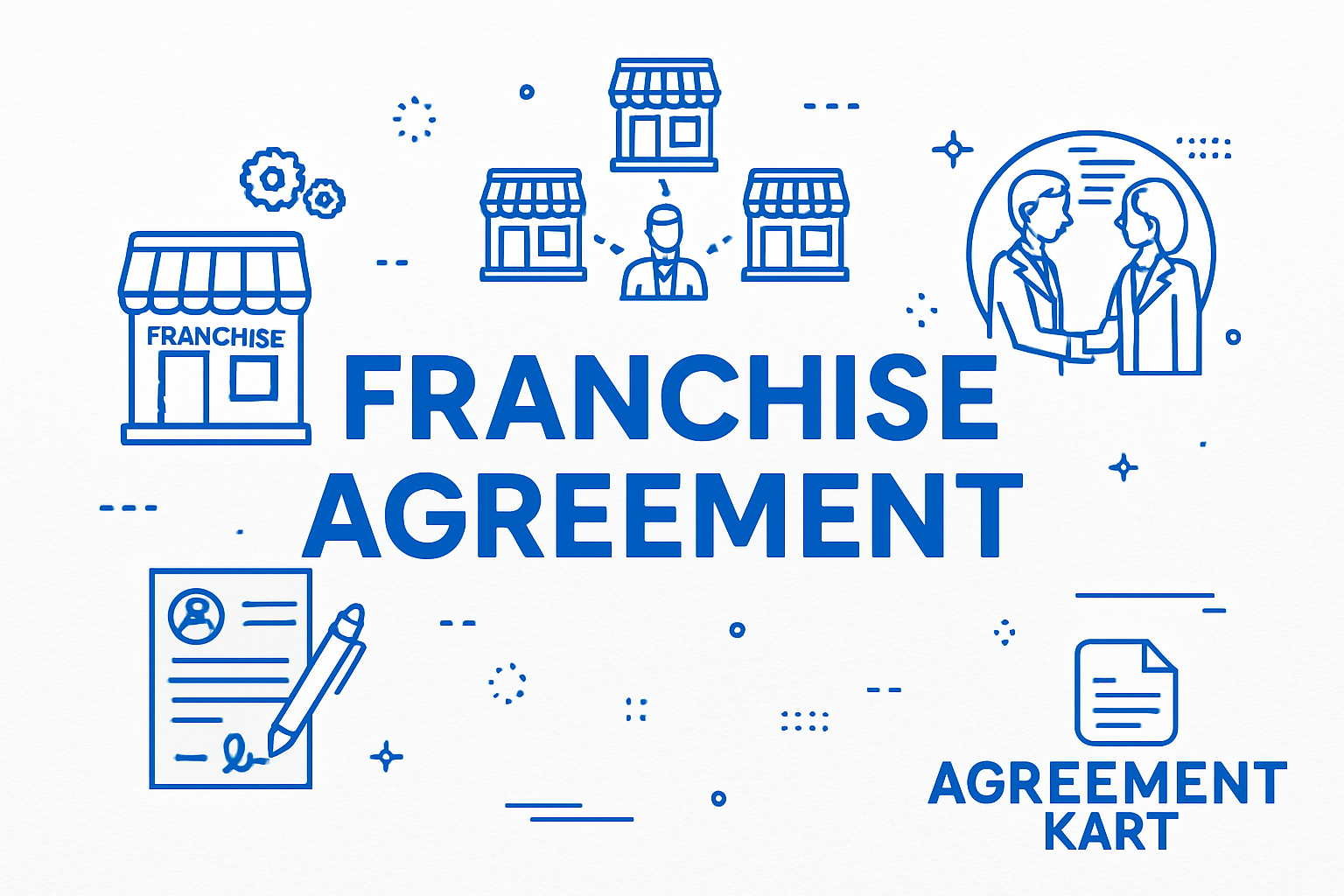Franchise Agreement: A Roadmap to Successful Business Expansion
By Agreement Kart – Your Legal Partner
Franchising is one of the fastest and most efficient methods of scaling a business across cities and regions without losing control over brand identity. But behind every successful franchise lies a strong Franchise Agreement – the legal backbone that binds the franchisor and franchisee together.
In this blog, we explore what a Franchise Agreement is, the various types of franchise models, benefits of franchising, and why having a legally sound franchise agreement drafted by experts like Agreement Kart is crucial.
What is a Franchise Agreement?
A Franchise Agreement is a legal document that outlines the terms and conditions between a franchisor (the business owner) and a franchisee (the person or entity that purchases the right to operate a franchise). It sets the foundation for their relationship and governs how the brand will be used and operated.
Franchise Business Models: FOCO, FOFO, COCO, FICO, COFO
In the world of franchising, understanding operational models is just as important as legal structuring. Let’s explore 5 popular business models used by Indian and global brands.
1. FOFO – Franchise Owned, Franchise Operated
- Ownership: Franchisee
- Operations: Franchisee
- Brand: Franchisor
The franchisee invests in the business, sets up operations, and manages the outlet. The franchisor provides branding, systems, SOPs, and sometimes training.
✅ Pros:
- Low risk for franchisor
- Rapid expansion
- Entrepreneurial freedom for franchisees
⚠️ Cons:
- Limited franchisor control over quality
- Success depends on franchisee commitment
2. FOCO – Franchise Owned, Company Operated
- Ownership: Franchisee
- Operations: Franchisor
The franchisee funds the setup and infrastructure, but the company manages day-to-day operations. Franchisee receives a fixed return or share in profits.
✅ Pros:
- Operational expertise from brand
- Better standardization and customer experience
- Franchisee earns passive income
⚠️ Cons:
- Higher involvement for franchisor
- Operational burden remains with company
3. COCO – Company Owned, Company Operated
- Ownership: Franchisor
- Operations: Franchisor
The brand sets up, owns, and operates the outlet. It has full control over investment, operations, and profit.
✅ Pros:
- Complete control over quality and brand image
- 100% profit retention
⚠️ Cons:
- High capital investment
- Slow expansion
4. FICO – Franchise Invested, Company Operated
- Ownership: Shared/Franchisee-invested
- Operations: Franchisor
Similar to FOCO, but franchisee may also take part ownership, with the company retaining the right to operate and control the outlet.
✅ Pros:
- Lower risk for both parties
- Franchisor retains control
- Franchisee benefits from operational expertise
⚠️ Cons:
- Profit-sharing
- Legal clarity needed in agreement
5. COFO – Company Owned, Franchise Operated
- Ownership: Franchisor
- Operations: Franchisee
📝 The brand funds the infrastructure but leases operations to a franchisee. The franchisee earns from operating profits, usually under revenue-sharing terms.
✅ Pros:
- Franchisee operates without capital burden
- Brand retains ownership
⚠️ Cons:
- Risk of mismanagement by operator
- Not scalable long-term
Each model needs customized franchise agreements covering:
- Profit-sharing structures
- IP usage and brand control
- Investment clauses
- Operational accountability
- Exit and termination conditions
At Agreement Kart, we specialize in drafting precise franchise agreements tailored to FOFO, FOCO, COCO, FICO, and COFO models — ensuring clarity, legal safety, and business alignment.
Benefits of Franchising Your Business
Franchising offers immense advantages for both franchisors and franchisees:
For Franchisors:
- Rapid Expansion: Enter new markets without investing heavy capital.
- Brand Growth: Consistent brand experience across multiple locations.
- Shared Risk: Expansion risks are shared with franchisees.
For Franchisees:
- Proven Business Model: Lower risk with a successful business template.
- Brand Recognition: Benefit from an established customer base.
- Training and Support: Get operational training and marketing guidance.
Why Expansion via Franchise is Smart
Franchising enables businesses to:
- Scale faster than company-owned models.
- Penetrate regional and tier-2/tier-3 cities effectively.
- Maintain operational consistency across locations.
- Generate revenue through franchise fees and royalties.
It is especially useful for businesses in food & beverage, education, fitness, retail, and services industries.
Importance of a Good Franchise Agreement
A well-drafted Franchise Agreement ensures that:
- Both parties are legally protected.
- Roles and responsibilities are clearly defined.
- Brand standards and quality control are maintained.
- Dispute resolution mechanisms are in place.
- Intellectual property rights are safeguarded.
Poorly drafted agreements can lead to legal conflicts, brand dilution, and financial loss.
Key Clauses in a Franchise Agreement
Some essential components include:
- Franchise Fees and Royalties
- Territorial Rights
- Duration and Renewal
- Training and Support
- Advertising Obligations
- Termination and Exit Clauses
- Non-compete and Confidentiality
Why Choose Agreement Kart for Franchise Agreements?
At Agreement Kart, we provide legally vetted, tailor-made franchise agreements that:
- Comply with Indian franchise and IP laws
- Reflect your unique business model
- Minimize legal and operational risks
- Are affordable and delivered quickly
Conclusion
Franchising is a powerful tool for business growth – but only when backed by a strong legal framework. A professionally crafted Franchise Agreement by Agreement Kart ensures that your brand, rights, and operations are secure, while offering franchisees a clear path to success.
Ready to expand your brand or invest in one?
✅ Choose the right model.
✅ Get the right agreement.
📞 +91 99720 31190
Visit Agreement Kart today and get your Franchise Agreement crafted by legal professionals.

